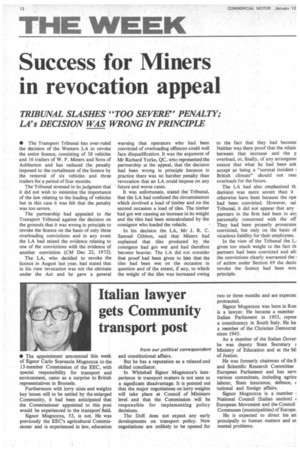Success for Miners in revocation appeal
Page 14

If you've noticed an error in this article please click here to report it so we can fix it.
TRIBUNAL SLASHES "TOO SEVERE" PENALTY; LA's DECISION WAS WRONG IN PRINCIPLE
• The Transport Tribunal has overruled the decision of the Western LA to revoke the entire licence, consisting of 38 vehicles and 16 trailers of W. F. Miners and Sons of Ashburton and has reduced the penalty imposed to the curtailment of the licence by the removal of six vehicles and three trailers for a period of four months.
The Tribunal stressed in its judgment that it did not wish to minimize the importance of the law relating to the loading of vehicles but in this case it was felt that the penalty was too severe.
The partnership had appealed to the Transport Tribunal against the decision on the grounds that it was wrong in principle to revoke the licence on the basis of only three overloading convictions and in any event the LA had mixed the evidence relating to one of the convictions with the evidence of another conviction (CM Dec 22, 1972).
The LA, who decided to revoke the licence in August last year, had stated that in his view revocation was not the ultimate under the Act and he gave a general warning that operators who had been convicted of overloading offences could well face disqualification. It was the argument of Mr Richard Yorke, QC, who represented the partnership at the appeal, that the decision had been wrong in principle because in practice there was no harsher penalty than revocation that an LA could impose on any future and worse cases.
It was unfortunate, stated the Tribunal, that the LA had confused the circumstances which involved a load of timber and on the second occasion a load of tiles. The timber had got wet causing an increase in its weight and the tiles had been miscalculated by the consignor who loaded the vehicle.
In his decision the LA, Mr J. R. C. Samuel Gibbon, said that Miners had explained that • tiles produced by the consignor had got wet and had therefore become heavier. The LA did not consider that proof had been given to him that the tiles had been wet on the occasion in question and of the extent, if any, to which the weight of the tiles was increased owing to the fact that they had become Neither was there proof that the relatic between that increase and the p overload, or, finally, of any arrangeme ensure that what he had been ask accept as being a "normal incident British climate" should not resu overloads for the future.
The LA had also emphasized th; decision was more severe than it otherwise have been because the ope had been convicted. However, sai Tribunal, it did not appear that any partners in the firm had been in an personally concerned with the off They had been properly prosecutec convicted, but only on the basis of vicarious liability for their employees.
In the view of the Tribunal the L) given too much weight to the fact th partners had been convicted and alt] the convictions clearly warranted the 1 of action under Section 69 the decisi revoke the licence had been wro: principle.








































































































